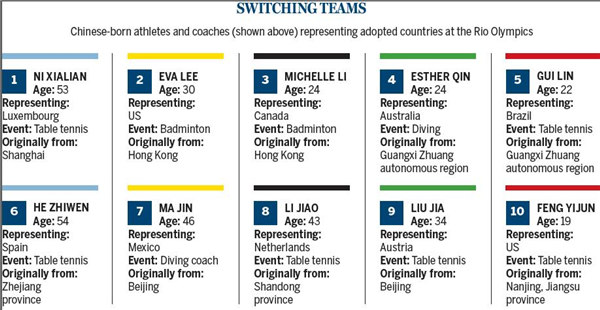Chinese, but competing under a different flag
Updated: 2016-08-15 02:15
By SUN XIAOCHEN(China Daily)

"I can't really stop as they (the Luxembourg table tennis federation) came back again and again asking me to play. I feel responsible for Luxembourg as a daughter-in-law of this country," said Ni, who married her husband, coach Tommy Danielsson, after settling down in the European country in 1991.
Following in their footsteps, a younger generation of Chinese talent, such as Liu Jia, have embraced the task of challenging the supremacy of their ancestral home. After moving to Austria in 1997, Liu stole the limelight at the 2001 World Championships by eliminating China's Yang Ying in the women's singles third round.
Liu, who started playing table tennis in Beijing at 11 years old, was chosen as Austria's flag-bearer for the Rio Olympics opening ceremony, to mark her fifth time representing the nation at the Games since Sydney 2000.
In addition to table tennis, Chinese names can also be found on several countries' rosters for Olympic badminton and diving events.
Ten Chinese-Australian athletes are part of the delegation from Down Under, while four athletes with Chinese heritage have been competing in Canada's colors in Rio de Janeiro.
However, the transition to a different culture, coupled with the language barrier, can make it tough for some Chinese athletes to fit in with their adopted environments.
Feng Yijun, a 19-year-old table tennis player who moved to the United States from Jiangsu province at age 8, said it is not always easy.
"If you move to the US too late, I don't think it's worth it," said Feng, whose first-round match in the men's singles at the Rio Olympics was against veteran He. “(Latecomers) will have a hard time learning the language and getting used to the social environment. Plus, the long wait for your citizenship is a hard process."
And not all China-born athletes receive a warm welcome in their new nation, as sometimes concerns are raised that their presence could compromise the development of homegrown talent.
"There have always been some complaints from native fans," said Peter Hubner, a sports reporter covering table tennis for German news agency Deutsche Presse Agentur. "They're afraid that the use of Chinese immigrants may affect the resource and funding allocated to developing native talents.
"It makes sense. But it will be easier for the second generation of Chinese to be accepted."
